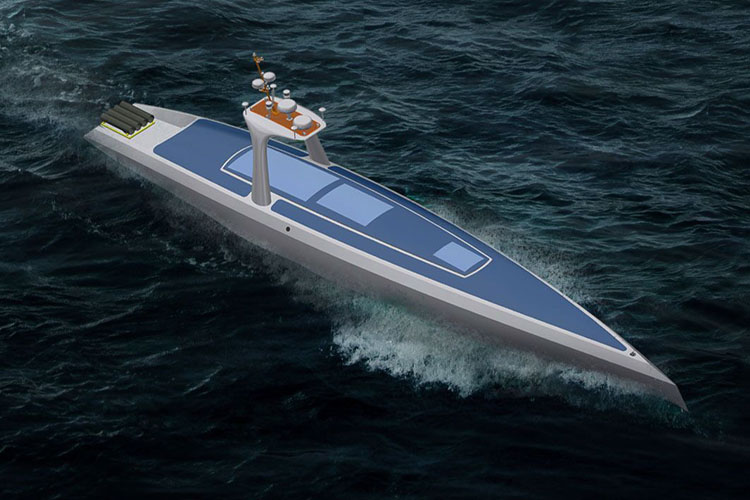
Oceanus, a new autonomous marine research vessel in development by Plymouth Marine Laboratory, is set to revolutionise ocean research
By DIVE Staff
Researching the world’s oceans is an immensely challenging task. There are around 360 million square kilometres (139 million square miles) of ocean – compared to just 149 sq km of land mass – so covering any significant portion of it is a logistically demanding task.
The current fleet of research vessels are large ships, which require a large crew, who in turn require large amounts of resources to keep the operation running smoothly – and who may be just a little hesitant of travelling across parts of the ocean where conditions are inclement and support prohibitively remote.
But what if you could take the crew out of the equation, and build a boat that can look after itself while carrying out huge amounts of automatic data sampling – even righting itself after capsizing, if necessary? That is the philosophy behind Oceanus, a ‘fully uncrewed, self-righting, lightweight, mono-hulled autonomous vessel’ currently in development at the UK’s Plymouth Marine Laboratory (PML), in association with unmanned underwater vehicle specialist M Subs Ltd.
Related articles:
- NERC robot fleet to investigate ocean carbon
- AI and robotics being used to revive coral reefs
- Deep Dive Dubai showcases humanoid OceanOneK robot explorer
- Scientists find more than 100 new species off the coast of Chile
Autonomous robotic vessels are already in use and are often deployed from research vessels, especially on deep-sea missions, but they are small and their range is limited. Oceanus, however, is 24 metres in length – similar in size to a decent dive boat – and has been designed to cover the distance between the UK and the Falkland Islands, with a large array of instrumentation to collect data along the way.
Although it will be powered by a diesel engine, removing the weight of a crew and the infrastructure required to support it will greatly reduce fuel consumption. Oceanus will also have a number of on-board ‘micro-energy generation devices’ and solar panels to help power its technology.
The Oceanus project began in October 2022, following in the footsteps of M Subs’ previous project, the Mayflower Autonomous Ship, a 15m-long trimaran which crossed the Atlantic during April and May of 2022, although the voyage was marred by a series of technical problems.
Partially sponsored by funding from the UK’s Natural Environment Research Council (NERC) – which announced funding for a fleet of autonomous underwater robots in 2023 – the ship’s design is almost complete, however, the team is currently seeking further funding to begin its construction, a process expected to take approximately two years.
The command centre for Oceanus will be at Plymouth Marine Laboratories, providing real-time oceanographic data to scientists in a way that is not possible at such scales for a human crew to measure. The autonomous research vessel will not completely eliminate the need for in situ sampling by scientists of more complex measurements, but it will provide a vast source of data for an environment that – despite having spent centuries at sea – we still know very little about.

‘A statistic I find quite shocking is that, to date, humans have explored less than 5 per cent of the world’s oceans,’ said PML Chief Executive Professor Icarus Allen. ‘And yet, the ocean does so much for us. It’s absorbed at least 25 per cent of the carbon emissions we have emitted, and between 50 per cent and 80 per cent of the oxygen we breathe comes from the ocean.
‘It is vital now, more than ever, to improve our understanding of the ocean and the changes taking place within it,’ added Allen, ‘the ocean is facing huge challenges and it’s vital we have as much evidence as possible to support decisions on how to protect and manage it sustainably.’
For more information, visit the Oceanus News Page on the PML website – which also contains contact details for people who may be interested in financially supporting the build phase of the vessel.


